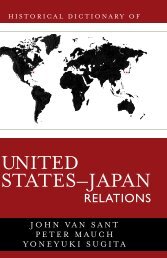Private Academies of Chinese Learning in Meiji Japan: The Decline ...
Private Academies of Chinese Learning in Meiji Japan: The Decline ...
Private Academies of Chinese Learning in Meiji Japan: The Decline ...
Create successful ePaper yourself
Turn your PDF publications into a flip-book with our unique Google optimized e-Paper software.
THE DECLINE OF THE JUKU 183onwards juku were tolerated if they catered for people above thecompulsory school age. Permission to open a juku, however, wasnot easily given. Two thirds <strong>of</strong> the juku are reported to haveclosed after the the proclamation <strong>of</strong> the Education Law. 34 Ehimeprefecture also took a stricter stance aga<strong>in</strong>st private educationthan the M<strong>in</strong>istry <strong>of</strong> Education’s policies warranted. When thenumber <strong>of</strong> private elementary schools nationwide drasticallydecreased after 1876, it did so particularly rapidly <strong>in</strong> Ehime. 35Not only <strong>in</strong> Akita did the authorities face resistance to theirpolicies. This is shown by the number <strong>of</strong> juku that cont<strong>in</strong>ued toexist after 1873, as well as by prefectural orders aga<strong>in</strong>st peopleoperat<strong>in</strong>g illicit juku. For example, <strong>in</strong> Osaka <strong>in</strong> 1875 localadm<strong>in</strong>istrators were ordered to report people operat<strong>in</strong>g jukuwithout hav<strong>in</strong>g applied for permission. An order to the villageadm<strong>in</strong>istration <strong>of</strong> Tennōji <strong>in</strong> 1893 similarly demanded thatmeasures be taken aga<strong>in</strong>st people runn<strong>in</strong>g private schoolswithout permission. 36What the authorities’ policies meant for <strong>in</strong>diviudals can beglimpsed from the situation <strong>of</strong> some <strong>of</strong> Ikeda Sōan’scorrespondents; former samurai were <strong>of</strong>ten especially hard-hit,s<strong>in</strong>ce they had no alternative source <strong>of</strong> <strong>in</strong>come. Yoshimura Hizan,formerly a teacher at the Hiroshima doma<strong>in</strong> school, applied toopen a juku when the school was abolished, but his applicationwas turned down. He and his son became elementary schoolteachers. In 1873 he was at last allowed to open a juku atelementary level. In 1876 he was forced to <strong>in</strong>clude other subjectsbesides kangaku, and <strong>in</strong> 1880 he had to close his juku. TamuraKanzan <strong>in</strong> Toyooka (now Hyōgo) prefecture had even greaterdifficulties. He became an elementary school teacher <strong>in</strong> 1873, butsoon resigned and applied to open a juku. His conduct as aschool teacher was called <strong>in</strong>to question and the applicationturned down. He resubmitted, but <strong>in</strong> 1878 he still had notreceived permission, and f<strong>in</strong>ally he had to give up the idea.Kusumoto Tanzan was likewise denied permission to cont<strong>in</strong>uehis juku, but as he wrote to Sōan <strong>in</strong> 1876, he had to run his juku <strong>in</strong>order to survive and “[…] if [my juku] is <strong>of</strong>ficially prohibited, Iwill order the students on the basis <strong>of</strong> this, and if they cont<strong>in</strong>ue tocome anyway, there is noth<strong>in</strong>g I can do”. Presumably many acted<strong>in</strong> the same way if they could get away with it. 37Thus the central government and the prefectures to vary<strong>in</strong>gdegrees aimed to ga<strong>in</strong> control over education and did not regardjuku favourably. But how significant was the conflict between













